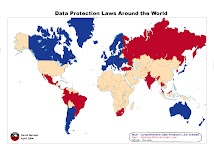Views vary widely on the subject of trawling through social networking sites as part of the pre-employment screening process. Here at Powerchex our view has always been that there are too many legal and ethical pitfalls to this process and for that reason we do not incorporate these searches to our screening process. As an employer you need to make up your mind of course. Here are two views on the subject that may help you decide:
______________________________________________________
Louisa Peacock reports for Personnel today:
A quarter of employers worldwide are checking social networking sites such as Facebook and MySpace for information about job candidates, research has revealed.
The study by talent management consultancy DDI found that 25% of 1,910 job interviewers across the globe, and 12% of employers in the UK, were checking out candidate profiles or photos before deciding whether to interview them.
More than half (52%) of those that did look up prospective employee profiles on such sites admitted they used the information to make hiring decisions.
The news comes just days after Personnel Today reported that employers should encourage their staff to use Facebook and Twitter to help network with their peers.
However, less than a third of 3,523 jobseekers (32%) surveyed by DDI worldwide, and just a quarter (25%) of applicants in the UK, believed that what they put on social networking sites might affect their chances of getting a job.
Steve Newhall, vice-president for Europe at DDI, said: "Interviewers should realise that much of what is put [on Facebook] is for fun, and is unlikely to reflect a candidate's on-the-job demeanour or performance. It's difficult to gauge when looking at Facebook-type data if the information is true or has any relevance for the job role in question. A well-planned and conducted selection process will uncover relevant information about candidates' ability to do the job."
The 2009 Global Interviewing Practices and Perceptions survey found that German employers were almost twice as likely as any other country to conduct online searches, with 46% reporting they use this technique to make hiring decisions.
The practice of checking social networking sites becomes more prevalent the younger the interviewer. Globally, only 19% of those over 50 checked these sites, compared to 46% of those under 25.
The global survey interviewed 248 employers and 704 jobseekers in the UK.
_____________________
Jo Wort, professional support lawyer, and Gagandeep Prasad, solicitor Charles Russell present the legal view on the subject:
There are several issues raised by this approach to recruitment. The first is one of potential discrimination arising out of the age profile of internet users. In adopting a policy of online application only, it is likely that many older candidates will be excluded before the recruitment process has even begun. If faced with an age discrimination claim, the company would have to seek to justify this approach.
Trawling through these sites on receipt of an application is pre-employment vetting. Potentially, this raises both discrimination and data protection issues. For example, there may be information obtained from these sites that relate to an individual's sexual orientation, or religious belief that impact, or are perceived to impact, on the eventual decision whether or not to recruit. Information that impacts on recruitment decisions in this way will be grounds for a discrimination claim.
A further issue with trawling these sites is the question of verification. What weight do you place on the information found? Was it placed by the individual themselves, or a disgruntled former friend or colleague? The Employment Practices Data Protection Code makes clear that an employer should "not place reliance on information collected from possibly unreliable sources. Allow the applicant to make representations regarding information that will affect the decision to finally appoint". The applicant should therefore be given the opportunity to deal with information that the company has found on a social networking site that negatively impacts on any decision whether or not to recruit.
Such searches are effectively pre-employment vetting and the Employment Practices Data Protection Code states that employers should "only use vetting thing as a means of obtaining specific information, not as a means of general intelligence gathering". This should only be undertaken where there are significant risks to clients/customer, and ideally only late in the recruitment stage, so that not all applicants are vetted routinely.
Searching social networking sites as a recruitment tool raises many potential issues and, as a matter of best practice, should not be generally adopted.
Subscribe to:
Post Comments (Atom)




No comments:
Post a Comment